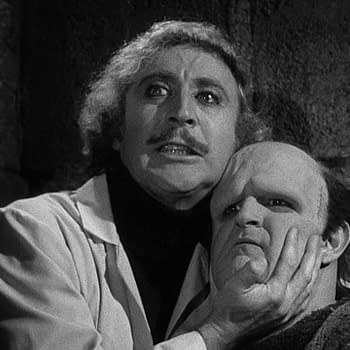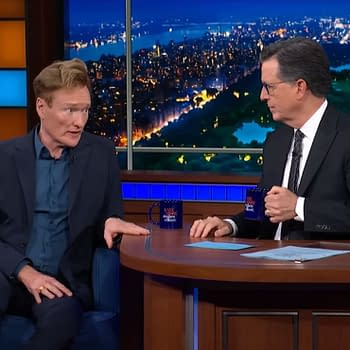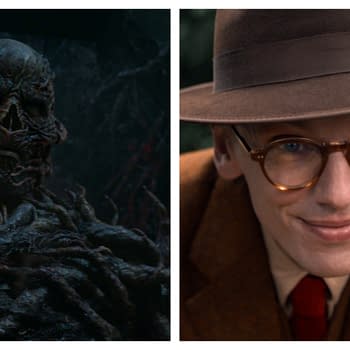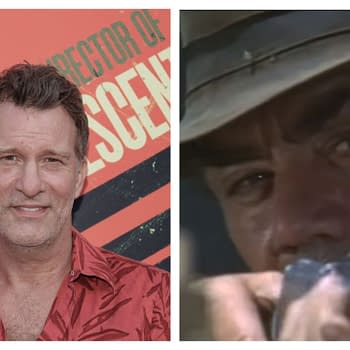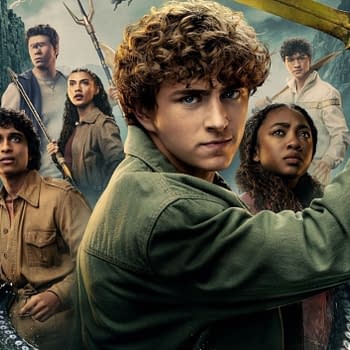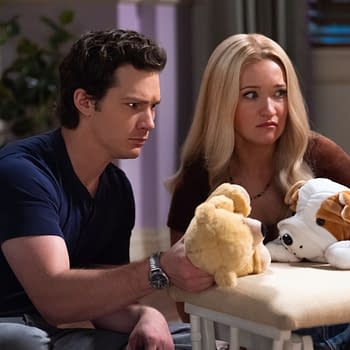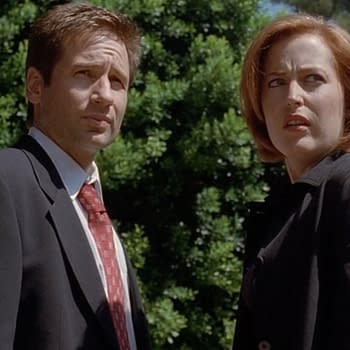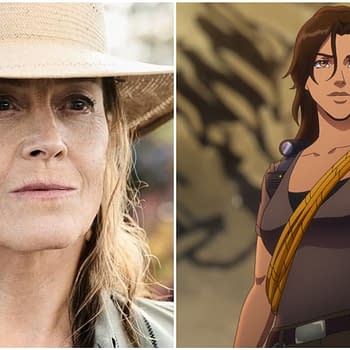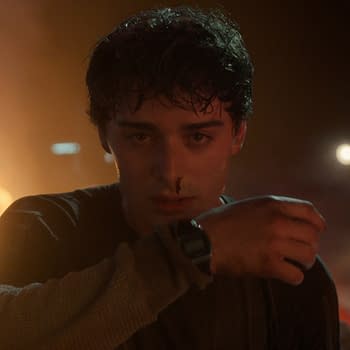Posted in: Audio Dramas, TV | Tagged: Mindrake: Background Anger, Mindraker, podcast, Roy Burdine, Sean Schemmel
Mindraker: Background Anger Creator & Star on 3-Year Journey, Strikes
Mindraker: Background Anger creator Roy Burdine and star Sean Schemmel (DBZ) spoke with Bleeding Cool about recording, strikes, and more.
Mindraker: Background Anger creator Roy Burdine and star Sean Schemmel are among those throughout the entertainment industry who relied on their resourcefulness to persevere during the COVID pandemic. The two go way back as collaborators in the animation scene while also sharing a fascination for creating a unique experience through the audio drama. Mindraker is an eight-episode sci-fi podcast drama from Spiral Opus Audio that follows MARU (Schemmel), a conflicted man with a box of divinely gifted powers. He's a Mindraker, a designation given to psychic assassins by the forces defending mankind in a spiritual war. The two spoke with Bleeding Cool about coordinating the talent internationally and working on the passion project in between their more mainstream work, influences, and thoughts on the WGA & SAG-AFTRA strikes.
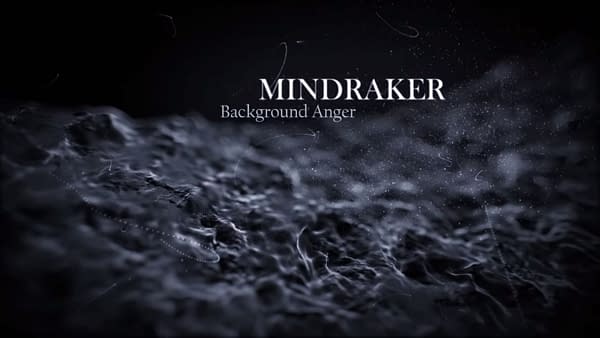
Mindraker: A Three-Year Passion Project Born from the Pandemic
Bleeding Cool: When it came to just recording the sessions, Sean, did you all share studio space, or did you conference like over Zoom?
Schemmel: We had to do it during the pandemic. Roy lives in Bakersfield, while I live in Los Angeles. I could have driven up there, but I have all the gear here, and Roy cast it from all over the world. You have some British actors in there, right, Roy?
Burdine: Yes.
Schemmel: We had to do it remotely and then count on everybody having decent enough gear, which they did. We got a great mix engineer from Belgium.
Burdine: Mark Labib, who's been a huge component to the show. He brought all that soundscape to it. I knew what I wanted, but I'm not a musician or an editor, so I had to find someone who had those qualities, and I got super lucky.
Schemmel: I would say that as an engineer myself, I'm fundamentally impressed with the mix. I didn't have to tweak it too much except for a little bit of the narration. I wanted that to sound a little warmer so that you'd hear a contrast between the narration and the dialog, but that was the only note I had. The mix is great, and he's quite talented.
How did you schedule over the course of the pandemic? Are you still recording new shows across the three-year span?
Schemmel: I had a busy schedule, and then during the pandemic, Roy's working his butt off on a variety of animation stuff. We'd record an episode, and then a few months go by, we do another episode. This went on throughout the pandemic. We were out of the pandemic when we wrapped up episodes seven and eight.
Burdine: Sean and I got going with recording his part, but I also had to record all of the other characters. It took time to get all of the actors recorded, then it takes the editor a month, a month and a half to do an episode. It depends on his schedule, too, because like us, he's working on other things. It took about a year and a half, maybe two years to complete all of the episodes.
Schemmel: Roy has a season two in the works.
Burdine: I've got the first couple of episodes written, so I'm looking to get started on that soon so we can follow this up.
Sean, how does a project like this compare to your other work with voiceovers, video games, and animation?
Schemmel: It felt like this is the kind of a story I like. Something I could do rather than just being sent another animation script. If there's any success from it, Roy and I will enjoy that later. As far as that goes, it was more like sitting down in my cozy studio and getting into a meditative state. Once you start doing that dialog, you get into a groove. I struggled with avoiding poetry reading clichés and I would put the timing in different spots. There were certain words I would hit that were designed to further emphasize a reference he's making to an '80s song or a twist on it. There are a lot of funny outtakes where I could tell that he was referencing an '80s song and I might sing it at that moment or do something silly. Generally, the sessions flowed quickly when we didn't break and started talking about our personal lives and politics from time to time [laughs]. Most of the time, once I started reading that first narration dialog, it would warm me up, I'd get in this place and then [changes in Maru's voice] I'm talking like this guy the whole time.
Burdine: A big influence for me was Joe Frank. He used to do these Sunday half-hour afternoon shows on NPR. It was this experimental stuff, a bunch of little bits that were strung together. It would be conversations and stories – it was amazing. It was a huge influence, and I played some of his stuff to Sean. Joe Frank also had a distinct voice which does sound a little like a noir detective, even though that's not what he was doing. I played it for Sean in terms of how to approach the narration. It's been a huge influence on me in doing anything in audio.
Schemmel: I took a large cue from those recordings of Joe Frank. I wasn't doing a Joe Frank impression, but it was that vibe.
With the WGA and SAG-AFTRA strikes kind of going on right now, how do you feel like it's affected both your careers? Do you find yourself doing things you're not normally doing or adapting to how things are?
Burdine: I've been fortunate. I'm working on a show called 'Grimsburg' for Fox right now. It's not part of that contract and not part of the strike, so we're lucky that we're able to keep working. I know a lot of people who are being directly affected by this.
Schemmel: None of the anime I work on pays residuals at all. I make more residuals off a tiny character on 'Sofia the First' than I did my entire first season of 'Dragon Ball Z.' Most of my income comes from public appearances, and my fans are good to me in that regard because I spent 25 years working on this character. They show me their appreciation every time I make a public appearance. I am massively in support of the strike. I am deeply concerned about the future of AI because I would be deeply offended if someone stole my voice and used it. The question we must ask ourselves as humans is, "Do we want robots telling our human story from writing to acting?" My answer is no. At the very least, I want full disclosure of whether something has AI in it. I won't watch AI stuff if I can avoid it.
Burdine: When you get into voices, writing, and these things, it's not like automation. It's theft. You have to steal something, and sure, you're going to manipulate it or whatever, but they're stealing other people's things and repurposing it. That's all it is. There's no art.
Schemmel: The AI voice thing has been on my mind for over ten years. I've been trying to have my voice patented as a unique biological structure, so the waveforms emitted from it can't be put into an AI, and my lawyers told me that that's not possible. I'm like, "Why not? It's my voice." It's upsetting. In fact, I'll tell you this I don't believe I have any future in voiceover, and my goals as an actor are to focus more on my online personality with my Twitch and YouTube channels and make money becoming an online entity.
I'm a hardcore artist in that regard. I find this whole modern scenario heartbreaking to the thing I love most in the world, which is voice acting. I must look at my next 20 years and think about how I'm going to survive without being a voice-over artist except for potentially my legacy work, which I'm always willing to do. I'm working on a couple of huge titles right now that are not under the strike that I can't talk about. I'm going to keep doing my legacy work until they replace me with an AI, and then I have to look at what my options are at that point. I feel strongly about it until everybody gets on the same page. I love that Roy and I will never use AI to replicate other people's voices. As long as Roy's creating cool stuff, I'll always use my voice.
Mindraker: Background Anger, which also stars Vinnie Pena, Greg Abbey, Victoria May, Whitton Frank, Michal Roxie Johnson, Richard Kingston, John C. Martin, Zach Selwyn, Jerry Schwartz, Brie Piper, and Noel Rodrigo, releases on Thursdays.






